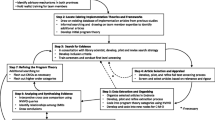Abstract
Program evaluation research is often too narrowly focused to build theoryabout dispute resolution while theory-driven ADR research is frequentlytoo far removed from programmatic realities to inform practice. To developan ADR evaluation research agenda that connects theory and practice, weneed to consider: making ADR context a central focus of research; undertakinga fuller account of the processes and the work of third parties inrelation to what skills and orientations parties bring with them to ADR asnegotiators; widening our view of ADR impact or result; and reexaminingwhat research methods are best for studying ADR programs. By shiftingour perspectives, placing negotiating parties closer to the center of ourstudy of ADR, and grounding research in the contexts that matter to policy-makersand practitioners, we could significantly advance research onthird-party intervention.
Similar content being viewed by others
References
Arrow, J., R. H. Mnookin, L. Ross, R. Wilson, A. Tversky, eds. 1995. Barriers to conflict resolution. New York: W.W. Norton
Bercovitch, J. 1991. International mediation and dispute settlement: Evaluating the conditions for successful mediation. Negotiation Journal 7: 17-30.
Bingham, G. 1986. Resolving environmental disputes: A decade of experience. Washington: The Conservation Foundation.
Brett, J. M., R. Drieghe, and D. L. Shapiro. 1986. Mediator style and mediation effectiveness. Negotiation Journal 2: 277-285.
Brett, J. M., Z. I. Barsness, and S. B. Goldberg. 1996. The effectiveness of mediation: An independent analysis of cases handled by four major service providers. Negotiation Journal 12: 259-269.
Carnevale, P. J. 1992. The usefulness of mediation theory. Negotiation Journal 8: 387-390.
Carnevale, P. J. and D. G. Pruitt. 1992. Negotiation and mediation. Annual Review of Psychology 43: 531-582.
Clarke, S. H. and E. E. Gordon. 1997. Public sponsorship of private settling: Court-ordered civil case mediation. Justice System Journal 19: 311-339.
Cobb, S. 1993. Empowerment and mediation: A narrative perspective. Negotiation Journal 9: 245-261.
Conley, J. and W. O'Barr. 1990. Rules and relationships: The ethnography of legal discourse. Chicago: University of Chicago Press.
Kakalik, J. S., T. Dunworth, L. A. Hill, D. McCaffrey, M. Oshiro, N. M. Pace, and M. Vaiana. 1996. An evaluation of mediation and early neutral evaluation under the Civil Justice Reform Act. Santa Monica, Calif.: Rand Corp.
Keilitz, S. 1994. Civil dispute resolution processes. In National symposium on court-connected dispute resolution research: A report on current research findings — Implications for courts and future research needs, edited by S. Keilitz. Williamsburg, Va.: National Center for State Courts.
Kleiboer, M. 1996. Understanding success and failure of international mediation. Journal of Conflict Resolution 40: 360-389.
McEwen, C. A. 1994. An evaluation of the Equal Employment Opportunity Commission's pilot mediation program. Washington: Report to the Equal Opportunity Commission.
———. 1998. Organizing for mediation: Variations in corporate approaches to dispute resolution and their implications for time, cost and quality. The Ohio State Journal of Dispute Resolution 14: 1-28.
McEwen, C. A. and R. J. Maiman. 1984. Mediation in small claims court: Achieving compliance through consent. Law & Society Review 18: 11-49.
———. and ———. 1988. Coercion and consent: A tale of two court reforms. Law & Policy 10: 3-24.
McEwen, C. A, L. Mather, and R. J. Maiman. 1994. Lawyers, mediation, and the management of divorce practice. Law & Society Review 28: 149-186
Ostermeyer, M. and S. Keilitz. 1997. Monitoring and evaluating court-based dispute resolution programs: A guide for judges and court managers. Williamsburg, Va.: National Center for State Courts.
Pruitt, D. G. 1995. Process and outcome in community mediation. Negotiation Journal 11: 365-378.
Regan, P. 1996. Conditions of successful third-party intervention in intrastate conflicts. Journal of Conflict Resolution 40: 336-359.
Rolph, E. and E. Moller. 1995. Evaluating agency alternative dispute resolution programs: A user's guide to data collection and use. Santa Monica, Calif.: Rand Corp.
Ury, W., J. Brett, and S. Goldberg. 1988. Getting disputes resolved: Designing systems to cut the costs of conflict. San Francisco: Jossey-Bass.
Author information
Authors and Affiliations
About this article
Cite this article
McEwen, C.A. Toward a Program-Based ADR Research Agenda. Negotiation Journal 15, 325–338 (1999). https://doi.org/10.1023/A:1007597603838
Issue Date:
DOI: https://doi.org/10.1023/A:1007597603838




